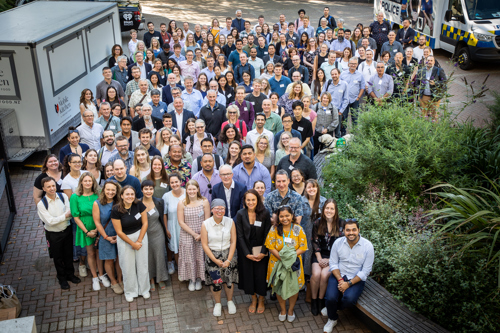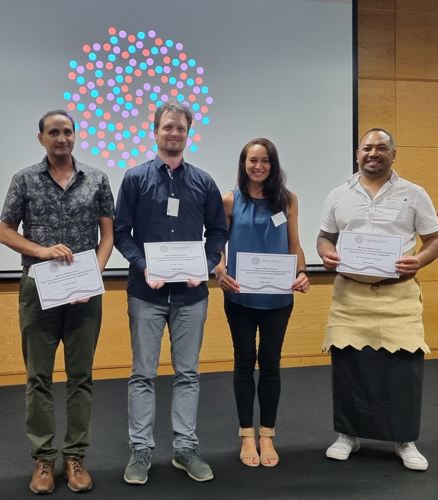MWC community gathers in Dunedin for 2023 Symposium
MWC Investigators from across the country gathered in Dunedin for the Maurice Wilkins Centre Symposium to hear and discuss MWC strategy, research updates in the core themes of metabolic health, cancer, and infectious diseases and initiate new collaborations.

Over 220 leading and emerging New Zealand biologists, chemists, geneticists, and clinical researchers attended the three-day event. Almost two years after the previous MWC Symposium, members of the Centre were keen to get together again for this multi-disciplinary meeting.
The MWC Symposium formally opened with a mihi whakatau to welcome the attendees to this event and encourage sharing and collaboration within the MWC community.
The first session began with updates from Professor Greg Cook (MWC Director) and Mr Conor Watene O’Sullivan (MWC Kaiārahi) on the Centre’s strategy and progress on the Māori Engagement Strategy. Exemplars of each theme’s research and discussions of topical issues were presented throughout the day ranging from advances in fundamental biology to new chemistry for developing potential future therapeutics to updates by MWC investigators working in the clinical trial and commercial spaces.
The successful first day was wrapped up with lightning talks about the innovative technology platforms available to MWC investigators: bioinformatics, induced pluripotent stem cells, flow cytometry, gene editing, structural biology techniques, electron microscopy, and pharmacology in biomedical research.
Following the first day's presentations, over 40 Early Career Researchers (ECRs) presented their research at the 2023 MWC Symposium Poster session in the evening. The event was an excellent chance for people to make connections and learn more about some of the research being done within the MWC community. A number of investigators made the most of the opportunity to start new collaborations and seed research ideas, some of which formed the basis for applications to the Flexible Research Programme later in 2023.
The second day was dedicated to the contributions of the Centre’s early career researchers in the rebranded Emerging Researchers’ Showcase. The MWC Early Career Steering Committee organised a comprehensive programme of 18 research presentations. The showcase demonstrated the breadth of research undertaken by ECRs within the network, from the chemical synthesis of therapeutic agents to studying genes, biomarkers, and biofilms to predict and improve patient responses to therapies to investigations of muscle mass and strength in metabolic health.

Included in the programme were presentations by the four winners of the inaugural Early Career Researcher Award, recognising their exceptional community engagement and mahi. This award recognised the extra work MWC ECRs do to make a positive impact in their communities, alongside their cutting-edge research. The inaugural winners were Dr Natalie Netzler (University of Auckland), Dr Petr Tomek (University of Auckland), Dr Mak Sarwar (University of Otago, Christchurch) and Mr Christopher Puliuvea (University of Auckland).
Closing the Emerging Researchers’ Showcase, three research talks and four poster presentations were recognised for their outstanding delivery and scientific excellence.
The MWC Symposium successfully closed with a productive korero in each research theme, with investigators presenting research and discussing strategies to progress their respective themes.